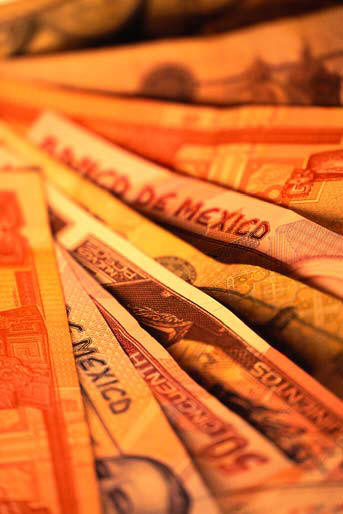Asian stocks fell for a third time in four days as concern mounted Europe's debt crisis will spread and South Korea held a mock artillery retaliation has led to threats by North Korea.
HSBC Holdings Plc, Europe's biggest lender by market value, fell 1.1 percent in Hong Kong. Ricoh Co., a manufacturer of office equipment that receives 23 percent of sales in Europe fell 1.9 percent in Tokyo. Sony Corp. fell 1.2 percent after the maker of Bravia TVs, said sales of TV sets fall short of its full-year target. Santos Ltd., Australia's third largest oil and gas producer, rose 4.1 percent after agreeing to sell part of its gas project in Australia.
"Debt problems in Europe continue to affect the appetite for risk," said Yoji Takeda, who helps manage about $ 1.1 billion at RBC Investment (Asia) Ltd. in Hong Kong. "There is also a slight concern at the escalation of tensions on the Korean peninsula, but is unlikely to become a major skirmish. Asian stocks remain attractive, given the region's strong economic growth."
The MSCI Asia Pacific Index fell 0.3 percent to 133.20 as of 8 pm in Tokyo, with more than two populations in decline for each advanced. The index rose to an intraday high of two 1/2-year high on 14 December as U.S. reports increased economic reliance on a global recovery, easing concerns that Europe's crisis of debt and China's measures to curb inflation, will affect growth.
South Korea's Kospi index declined 0.3 percent, compared to earlier losses of 1.5 percent. The government went ahead with a live firing drill to Yeonpyeong Island, a month after North Korea bombed the island near a disputed maritime border off the west coast of the peninsula, killing four people.
Oracle, RIM
Japan's Nikkei 225 Stock Average fell 0.9 percent. Shanghai, China Composite Index fell 1.4 percent and Hong Kong's Hang Seng index fell 0.3 percent. Australia S & P / ASX 200 lost 0.6 percent. India's Sensitive Index gained 0.1 percent.
Future over 500 of Standard & Poor's fell 0.2 percent today. The indicator rose 0.1 percent in New York on December 17 at 1243.91, its highest close since September 2008 as better than expected earnings forecasts from Oracle Corp. and Research In Motion Ltd., as well as acquisition of a regional bank in Europe overshadowed concerns debt crisis from spreading.
European shares fell on December 17 as an agreement between the leaders of the region to create a mechanism for crisis management to alleviate the concern that some euro zone nations can not pay their debts. Ireland's credit rating was reduced five levels by Moody's Investors Service on 17 December.
The decline in HSBC
HSBC fell 1.1 percent to $ 79.25 in Hong Kong. Standard Chartered Plc, the British bank that receives three-quarters of revenue from Asia, dropped 1.7 percent to HK $ 210 in Hong Kong.
"The concern is that European investors continue to see outbreaks of sovereign debt that could affect the global economy," said Don Williams, who helps manage about $ 1.8 million at Platypus Asset Management Ltd. in Sydney
An indicator of the companies in information technology, had the second-biggest decline among 10 industry groups in the MSCI index of Asia Pacific.
Ricoh fell 1.9 percent to 1168 yen in Tokyo. HTC Corp., the maker of mobile phones in Taiwan that has Europe as its second largest market after the United States, declined 0.8 percent to NT $ 865. LG Display Co., the world's No. 2 maker of flat panel displays which receives about 18 percent of sales in Europe, sank 2.6 percent to ₩ 39.200 in Seoul.
Objective Sony TV
Sony Corp., the third largest worldwide manufacturer of televisions, fell 1.2 percent to 2.930 yen. TV sales in the year ending March 31 may miss a target of 25 million units a "little," Vice President Hiroshi Yoshioka said today without elaborating.
Drug manufacturers in China fell after the Economic Observer reported that the government could reduce drug prices by an average of 40 percent.
Kangmei Pharmaceutical Co. sank 4.6 percent to 21.15 yuan in Shanghai. Beijing Tiantan Biological Products Corp. retreated 2.8 percent to 23.22 yuan, while North China Pharmaceutical Co. fell 2.6 percent to 16.46 yuan.
Shares of shipping companies bulk fell after the Baltic Dry Index of shipping rates for commodities fell 1.4 percent in London on 17 December to its lowest level since August 5, extending its fall session overnight.
China Cosco Holdings Ltd., China's largest dry bulk, fell 1.2 percent to $ 8.03 in Hong Kong in Hong Kong. STX Pan Ocean Co., South Korea's largest, fell 2.6 percent to 11,400 won. Hyundai Merchant Marine Co. fell 4.6 percent to ₩ 39,750.
Rally Japan?
The MSCI Asia Pacific index rose 11 percent in 2010 to 17 December, compared with gains of 12 percent in the S & P 500 and 9 percent in the Stoxx Europe 600 index. Stocks in Asia benchmark were valued at 14.7 times estimated earnings on average at the close on December 17, versus 14.6 times for the S & P 500 and 12.3 times for the Stoxx 600.
Japan's Nikkei 225 has underperformed the regional benchmark, since it has fallen 2.3 percent this year through Dec. 17. Kathy Matsui, chief equity strategist for Japan at Goldman Sachs Group Inc. in Tokyo, is telling clients to buy cars and technology producers because the benefits will increase as withdrawing yen against the dollar after hitting a 15-year high in October.
"Many investors make the mistake of being too emotional hung on the structural problems in Japan, and therefore cyclical opportunities are lost," said Matsui, 45, who has covered Japanese equities for 20 years. "If you have the stars aligned to a better U.S. economy, weak yen, the profits going back to 2007, peaks and very low birth weight foreign investors, which could easily deliver 15 to 20 percent .
Taiwan Airlines
Among the shares that advanced, Santos rose 4.1 percent to $ 13.50. The company will increase by 665 million U.S. dollars ($ 658 million) selling a 15 percent stake in its proposed Gladstone liquefied natural gas to Total SA and Korea Gas Corp. has just completed a sale of shares to institutional investors, increase of A $ 500 million.
Taiwan airlines advanced after the Economic Daily News reported that the island may raise the daily limit of Chinese tourist arrivals to 4,000 from 3,000. The newspaper did not say where it obtained the information. Liu Te-shun, vice chairman of mainland China's Taiwan Affairs Council, did not immediately return calls to his office.
China Airlines Ltd., Taiwan's largest airline, increased 1.9 percent to NT $ 24.80. Its smaller rival EVA Airways Corp. rose 3.9 percent to NT $ 36.40.
In Bombay, Hero Honda Motors Ltd., maker of half the motorcycles sold in India, surged 18 percent to 1,980.5 rupees. The company said sales of Honda Motor Co. 's of its 26 percent stake in the company in India will lead to lower royalty payments technology. Honda, the world's largest manufacturer of motorcycles, agreed last week to sell its stake to Hero Group for $ 1.9 million so it could focus on the development of full ownership unit in India.









